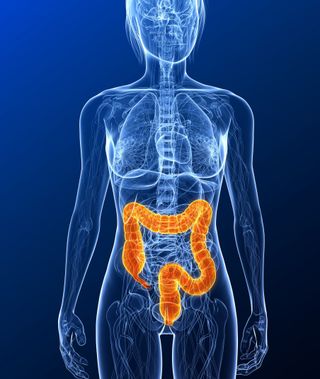Cancer Prevention How-To: Don't Go to Outer Space

Space travel may increase the risk of colon cancer, according to a new study in mice.
The results show mice exposed to a type of high-energy radiation prevalent in space, called 56Fe radiation, developed tumors in their intestines.
A second study by the same group of researchers suggests why this might be: Cosmic radiation prevents gut cells from destroying a protein called beta-catenin, which in turn, promotes uncontrolled cell growth, the researchers said.
In space, astronauts are exposed to levels of radiation that, on Earth, have been shown to increase the risk of cancer. But exactly how much a person's cancer risk might increase after a trip to space it not known.
By studying mice, the researchers hope to develop a better estimate of the risk, as well as strategies that could protect space travelers, the researchers said.
"Sustained exposure during prolonged space missions, such as a mission to Mars, and lengthy stays at the International Space Station may cause significant cosmic radiation dose accumulation in astronauts, and thus remains a long-term health concern of space exploration," said study researcher Dr. Kamal Datta, of the Georgetown Lombardi Comprehensive Cancer Center in Washington, D.C.
"Knowing how space radiation induces tumor formation will allow us to develop preventive strategies that target this specific signaling pathway," said study researcher Shubhankar Suman, also of Georgetown University.
Sign up for the Live Science daily newsletter now
Get the world’s most fascinating discoveries delivered straight to your inbox.
In the future, researchers might be able to develop drugs that astronauts could take to protect them from the radiation's effects, said Dr. Albert Fornace, of Georgetown University. Astronauts already take vitamin D for nutritional reasons, a vitamin that has been suggested by some studies to protect against cancer, Fornace said.
The findings are from two separate studies presented this week at the American Association for Cancer Research meeting in Washington, D.C.
Pass it on: Avoiding space travel is one way to avoid raising your risk of colon cancer.
Follow MyHealthNewsDaily on Twitter @MyHealth_MHND. Findus on Facebook.

Rachael is a Live Science contributor, and was a former channel editor and senior writer for Live Science between 2010 and 2022. She has a master's degree in journalism from New York University's Science, Health and Environmental Reporting Program. She also holds a B.S. in molecular biology and an M.S. in biology from the University of California, San Diego. Her work has appeared in Scienceline, The Washington Post and Scientific American.
